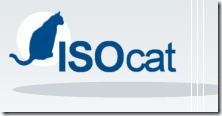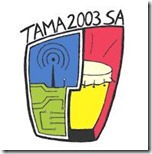 The Localization Industry Standards Association (LISA) reminded us in their recent Globalization Insider that they had declared 2010 the ‘Year of Standards.’ It resonates with me because socializing standards was one of the objectives that I set for this blog. Standards and standardization are the essence of terminology management, and yet practitioners either don’t know of standards, don’t have time to read them, or think they can do without them. In the following weeks, as the ISO Technical Committee 37 ("Terminology and other language and content resources") is gearing up for the annual meeting in Dublin, I’d like to focus on standards. Let’s start with ISO 12620.
The Localization Industry Standards Association (LISA) reminded us in their recent Globalization Insider that they had declared 2010 the ‘Year of Standards.’ It resonates with me because socializing standards was one of the objectives that I set for this blog. Standards and standardization are the essence of terminology management, and yet practitioners either don’t know of standards, don’t have time to read them, or think they can do without them. In the following weeks, as the ISO Technical Committee 37 ("Terminology and other language and content resources") is gearing up for the annual meeting in Dublin, I’d like to focus on standards. Let’s start with ISO 12620.
ISO 12620:1999 (Computer applications in terminology—Data categories—Part 2: Data category registry) provides standardized data categories (DCs) for terminology databases; a data category is the name of the database field, as it were, its definition, and its ID. Did everyone notice that terminology can now be downloaded from the Microsoft Language Portal? One of the reasons why you can download the terminology today and use it in your own terminology database is ISO 12620. The availability of such a tremendous asset is a major argument in favor of standards.
I remember when my manager at J.D. Edwards slapped 12620 on the table and we started the selection process for TDB. It can be quite overwhelming. But I turned into a big fan of 12620 very quickly: It allowed us to design a database that met our needs at J.D. Edwards.
When I joined Microsoft in 2004, my colleagues had already selected data categories for a MultiTerm database. Since I was familiar with 12620, it did not take much time to be at home in the new database. We reviewed and simplified the DCs over the years, because certain data categories chosen initially were not used often enough to warrant their existence. One example is ‘animacy,’ which is defined in 12620 as “[t]he characteristic of a word indicating that in a given discourse community, its referent is considered to be alive or to possess a quality of volition or consciousness”…most of the things documented in Term Studio are dead and have no will or consciousness. But we could simply remove ‘animacy’, while it would have been difficult or costly to integrate a new data category late in the game. If you are designing a terminology database, err on the side of being more comprehensive. Because we relied on 12620, it was easy when earlier in 2010 we prepared for making data exportable into a TBX format (ISO 30042). The alignment was already there, and communication with the vendor, an expert in TBX, was easy.
 ISO 12620:1999 has since been retired and was succeeded by ISO 12620:2009, which “provides guidelines […] for creating, selecting and maintaining data categories, as well as an interchange format for representing them.” The data categories themselves were moved into the ISOcat “Data Category Registry” open to use by anyone.
ISO 12620:1999 has since been retired and was succeeded by ISO 12620:2009, which “provides guidelines […] for creating, selecting and maintaining data categories, as well as an interchange format for representing them.” The data categories themselves were moved into the ISOcat “Data Category Registry” open to use by anyone.
ISO 12620 or now the Data Category Registry allows terminology database designers to apply tried and true standards rather than reinventing the wheel. As all standards, they enable quick adoption by those familiar with them and they enable data sharing (e.g. in large term banks, such as the EuroTermBank). If you are not familiar with standards, read A Standards Primer written by Christine Bucher for LISA. It is a fantastic overview that helps navigate the standardization maze.
 Let’s start with South African English. If you visit this beautiful country, you will very likely notice that ’just now’ “denotes varying levels of urgency. Phoning someone ‘now now’ is sooner than ‘now’ or ‘just now’ but not as soon as ‘right now’” according to this
Let’s start with South African English. If you visit this beautiful country, you will very likely notice that ’just now’ “denotes varying levels of urgency. Phoning someone ‘now now’ is sooner than ‘now’ or ‘just now’ but not as soon as ‘right now’” according to this 
